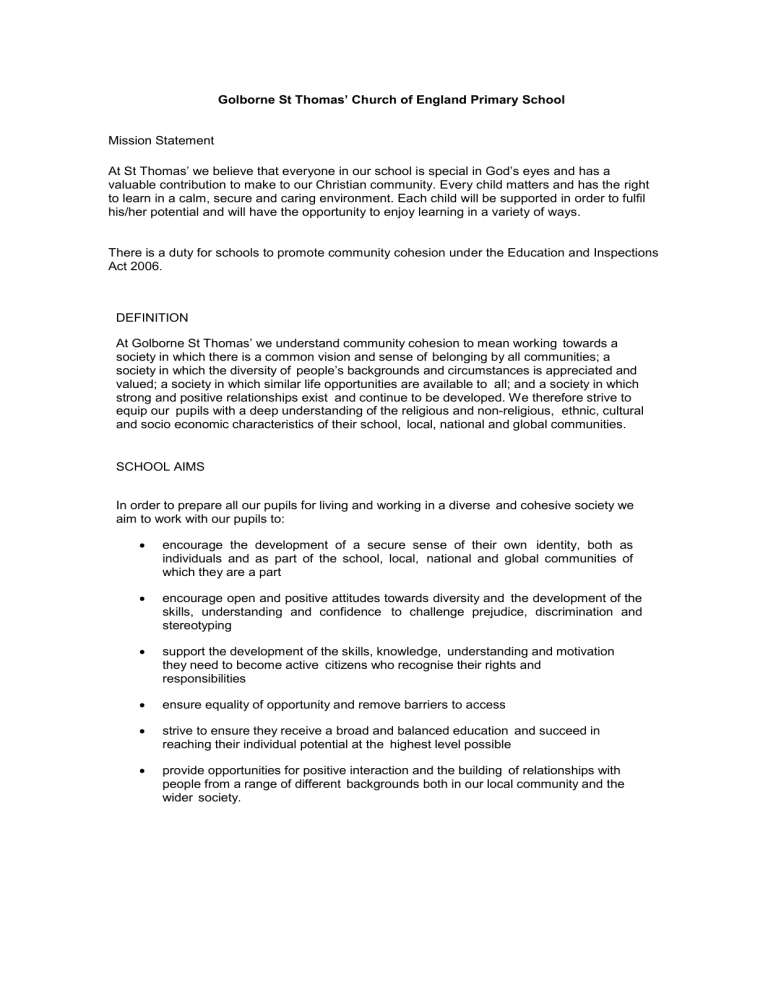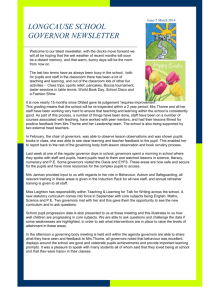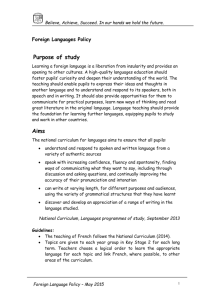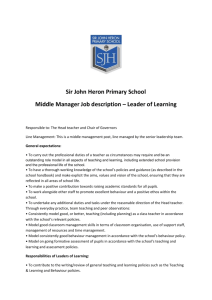Community CohesionPolicy - Golborne St Thomas` Church of

Golborne St Thomas’ Church of England Primary School
Mission Statement
At St Thomas’ we believe that everyone in our school is special in God’s eyes and has a valuable contribution to make to our Christian community. Every child matters and has the right to learn in a calm, secure and caring environment. Each child will be supported in order to fulfil his/her potential and will have the opportunity to enjoy learning in a variety of ways.
There is a duty for schools to promote community cohesion under the Education and Inspections
Act 2006.
DEFINITION
At Golborne St Thomas’ we understand community cohesion to mean working towards a society in which there is a common vision and sense of belonging by all communities; a society in which the diversity of people’s backgrounds and circumstances is appreciated and valued; a society in which similar life opportunities are available to all; and a society in which strong and positive relationships exist and continue to be developed. We therefore strive to equip our pupils with a deep understanding of the religious and non-religious, ethnic, cultural and socio economic characteristics of their school, local, national and global communities.
SCHOOL AIMS
In order to prepare all our pupils for living and working in a diverse and cohesive society we aim to work with our pupils to:
encourage the development of a secure sense of their own identity, both as individuals and as part of the school, local, national and global communities of which they are a part
encourage open and positive attitudes towards diversity and the development of the skills, understanding and confidence to challenge prejudice, discrimination and stereotyping
support the development of the skills, knowledge, understanding and motivation they need to become active citizens who recognise their rights and responsibilities
ensure equality of opportunity and remove barriers to access
strive to ensure they receive a broad and balanced education and succeed in reaching their individual potential at the highest level possible
provide opportunities for positive interaction and the building of relationships with people from a range of different backgrounds both in our local community and the wider society.
ROLES AND RESPONSIBILITIES
The governors will ensure that:
the school complies with its aim to promote community cohesion;
The head teacher will ensure that:
this policy is readily available and that governors, staff, pupils and their parents are aware of it and are updated on its progress;
all staff understand their responsibilities and receive appropriate support and training if necessary;
this policy and its procedures are followed.
All staff will ensure that:
they have read the policy and understand their responsibilities;
they promote equality of opportunity and positive attitudes to diversity in accordance with this policy and other relevant policies.
The Community Cohesion Leader (Mrs C Morris?) will ensure that:
practice in school supports the aims and procedures outlined in this policy;
they undertake appropriate training in order to support colleagues in carrying out their responsibilities;
staff, governors, parents and pupils are kept up to date with relevant information;
Monitoring and assessment of the impact of this policy takes place.
POLICY INTO PRACTICE
We intend to meet our duty in the three areas of religion and non- religion, ethnicity and culture and socio-economics through the following
1. Teaching, learning and the curriculum
The Teaching and Learning Policy is reviewed on a cycle of policy review by all staff and governors. Through this policy being put into practice we will actively:
Value diversity
Promote shared values
Promote awareness of human rights
Develop skills of participation and responsible action
Integrate opportunities to discuss relevant issues across the curriculum
Monitor and assess the impact of teaching, learning and the curriculum
All subject areas are reviewed annually to ensure the curriculum promotes awareness of diversity, shared values, exploration of identity and human rights where appropriate and this will be monitored by curriculum subject leaders.
Teaching methods will, where appropriate, encourage discussion, questioning and reflection
– Circle Time, PSHE, assemblies, literacy, drama, role play, debates.
Staff will receive relevant training and support to ensure they feel confident in promoting discussions around sensitive issues.
Subject leaders will monitor learning and resources and the curriculum in their subject area to ensure they meet the aims of this policy.
2. Equity and excellence
The Equal Opportunities Policy is reviewed annually. Through this policy being put into practice we ensure:
Equal opportunities for all pupils
That we will remove barriers to access and participation in learning and wider activities
That we will collect and interpret data to identify areas of concern
That we will work to eliminate variations in outcomes for different groups
The Disability Equality Scheme and the Accessibility Plan are reviewed annually by governors and staff. The DES has had full parental consultation from parent/carers with a wide range of backgrounds. The head teacher and governors ensure that this plan is acted upon.
In line with our Equal Opportunities Policy , data is rigorously analysed to identify pupils at risk of underachieving and appropriate intervention strategies are utilised. Using Raise online
SEN children, those with statements, gender groups, ethnic groups, FSM and summer-born children are analysed to check on attainment, achievement and progress.
3. Engagement and Extended Services
We will:
Provide opportunities for children and families to interact with people from different backgrounds/ages/cultures and build positive relationships through inviting speakers into lessons and assemblies to actively promote and celebrate differences and overcome prejudice.
Forge and strengthen links with different schools and different communities. We intend to look into the possibility of linking with an ethnically-diverse school.
Continue to take part in any relevant activities with our local cluster schools . The head teachers and staff liaise on a range of community projects to establish best practice in community cohesion.
Regularly consult with pupils through the Lancashire Pupil Attitude Questionnaire.
Consultation is also sought through regular in-house pupil questionnaires.
Invite relatives to school productions and class assemblies and perform carols for the local community.
4. Monitoring and assessment
The progress and impact of this policy on pupils, staff and the community will be monitored through:
Children’s responses in questionnaires.
Children’s discussions in lessons and assemblies
Data will be scrutinised through RAISE on line to ensure that all pupil groups progress. The analysis of data will enable the leadership team/governors to set priorities and action plans for any underperforming groups if necessary.
The head teacher, deputy head teacher/SENCo, Community Cohesion
Leader and all relevant staff are involved in the analysis of this data.
The action points relating to this are evidenced in the School Improvement
Plan.
Clear criteria for measuring the success of the plan in terms of pupil standards will be evidenced in the attainment section of the SEF. The monitoring of teaching in this area will be achieved through Ofsted and performance management lesson observations. The success of learning will be monitored through lesson observations, monitoring of subject standards through termly CPD meetings, and pupil and staff responses/discussions.
The policy/action plan will be monitored by the senior leadership team and the governors. Staff will be involved with content and actions of both.
Evaluation will be reported as an item at governors meetings every term.
Review Spring 2014
Date: October 2013
Signed:……………………………………………..Mr P Gleave –Chair of Governors








